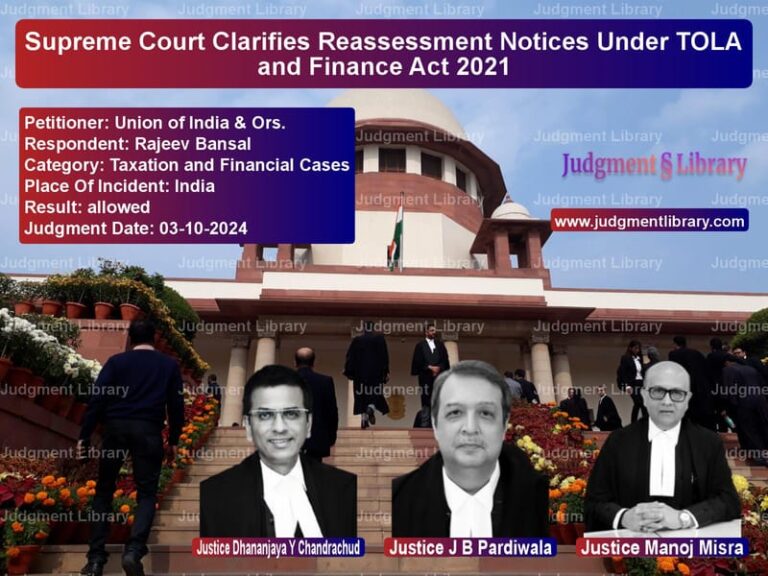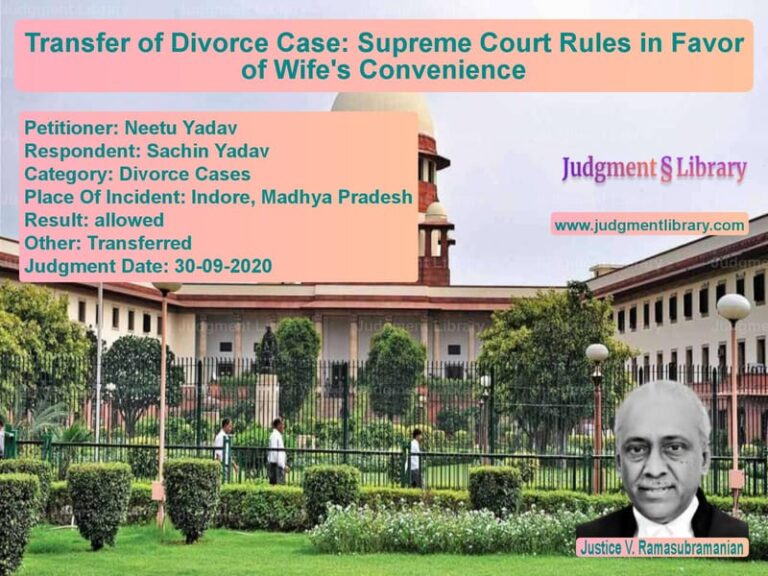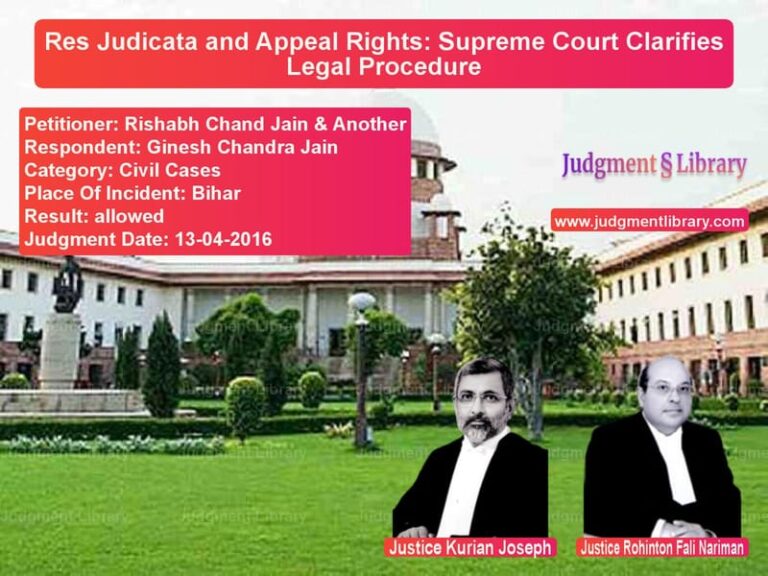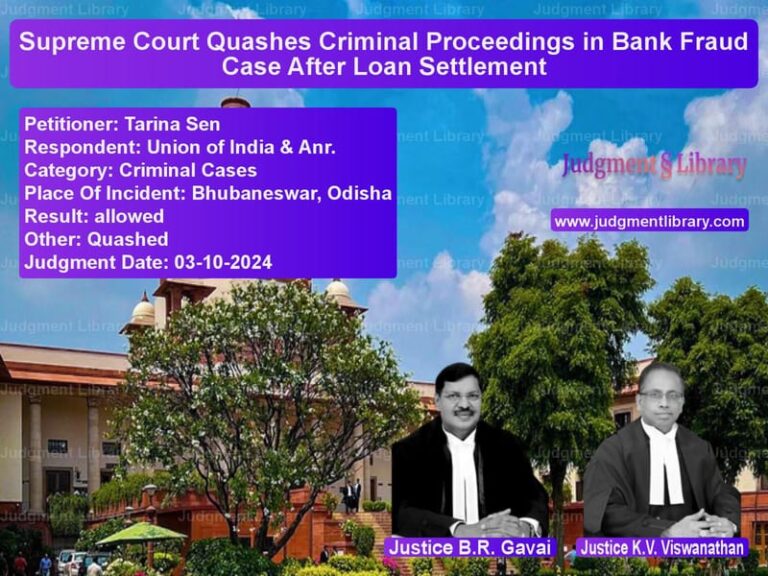Supreme Court Rules on Res Judicata in Civil Disputes: Importance of Comprehensive Issue Framing
The Supreme Court of India recently delivered an important judgment in the case of Sathyanath & Anr. vs. Sarojamani, addressing the issue of whether a suit can be dismissed solely on the ground of res judicata without examining other issues. The case provides crucial guidance on the interpretation of Order XIV Rule 2 of the Civil Procedure Code (CPC) and the need for courts to decide all issues comprehensively.
The Supreme Court ruled that the Madras High Court erred by directing the trial court to frame res judicata as a preliminary issue. The judgment emphasized that courts must pronounce judgment on all issues to prevent unnecessary delays and avoid remanding cases back to lower courts.
Background of the Case
The dispute originated from a suit filed by the appellants, Sathyanath and another, against their paternal aunt, Sarojamani. They sought a declaration that they were the absolute owners of the suit property and challenged a prior judgment and decree in O.S. No. 65 of 2003, claiming it to be null and void.
The respondent, Sarojamani, contended that the suit was barred by res judicata since the matter had already been decided in the previous suit. She filed an application requesting that the trial court frame res judicata as a preliminary issue under Order XIV Rule 2(2) CPC. The trial court rejected her request, leading to a revision petition in the High Court, which ruled in her favor and directed the trial court to frame res judicata as a preliminary issue.
Key Legal Issues
- Whether res judicata can be framed and decided as a preliminary issue before deciding other issues in the suit.
- Whether Order XIV Rule 2 CPC mandates the trial court to pronounce judgment on all issues.
- Whether the Madras High Court was justified in remanding the case to the trial court for framing a preliminary issue on res judicata.
Arguments Presented
Petitioner’s (Sathyanath & Anr.) Arguments
- Order XIV Rule 2, as amended in 1976, mandates courts to pronounce judgment on all issues, not just preliminary issues.
- Deciding only a preliminary issue like res judicata could lead to unnecessary appeals and delays, defeating the purpose of expeditious disposal of suits.
- The trial court had rightly dismissed the request to frame res judicata as a preliminary issue, following the correct interpretation of procedural law.
- The Madras High Court’s direction to frame res judicata as a preliminary issue violated the intent of the procedural reforms under CPC.
Respondent’s (Sarojamani) Arguments
- The suit was barred by res judicata as the matter had already been adjudicated in O.S. No. 65 of 2003.
- Since res judicata could dispose of the entire case, it should be decided as a preliminary issue before going into other factual matters.
- Order XIV Rule 2(2) CPC allows courts to decide preliminary issues first if they relate to jurisdiction or legal bars to the suit.
Supreme Court’s Observations and Ruling
1. Mandate of Order XIV Rule 2 CPC
The Supreme Court ruled that Order XIV Rule 2 CPC requires courts to pronounce judgment on all issues, except when the issue exclusively relates to:
- (a) Jurisdiction of the court, or
- (b) A bar to the suit created by law.
The Court held:
“The amendment to Order XIV Rule 2 was intended to prevent delays and remands. Trial courts must decide all issues comprehensively instead of deciding preliminary issues in isolation.”
2. Res Judicata Is a Mixed Question of Law and Fact
The Court ruled that res judicata is often a mixed question of law and fact, requiring a thorough examination of pleadings, previous judgments, and factual circumstances. Therefore, it should not be decided in isolation as a preliminary issue.
“Res judicata requires consideration of pleadings, parties, and previous decisions. Courts should not separate it from other issues, as doing so could result in piecemeal litigation.”
3. Avoiding Unnecessary Remands
The Supreme Court criticized the practice of deciding preliminary issues separately, which often leads to appeals and remands, delaying justice. The Court stated:
“Directing trial courts to frame res judicata as a preliminary issue increases the risk of unnecessary remands. The mandate of Order XIV Rule 2 must be followed to prevent delays.”
4. High Court’s Order Was Incorrect
The Court found that the Madras High Court had misapplied procedural law by directing the trial court to frame res judicata as a preliminary issue. It set aside the High Court’s order and reinstated the trial court’s decision.
Read also: https://judgmentlibrary.com/land-acquisition-and-lapsing-of-proceedings-supreme-courts-verdict/
“The High Court’s order violates the express provisions of Order XIV Rule 2. The trial court was correct in refusing to frame a preliminary issue on res judicata.”
Impact of the Judgment
1. Ensuring Comprehensive Issue Resolution
The ruling ensures that trial courts address all issues together, preventing piecemeal litigation and unnecessary delays.
2. Strengthening Procedural Reforms
The judgment reinforces the intent of the 1976 CPC amendments, emphasizing that courts must pronounce judgment on all issues rather than isolating preliminary issues.
3. Clarification on Res Judicata
The ruling clarifies that res judicata, being a mixed question of law and fact, should not be treated as a standalone preliminary issue.
4. Preventing Unnecessary Appeals
By directing trial courts to decide all issues together, the ruling reduces the likelihood of multiple appeals and remands, ensuring quicker resolution of cases.
Conclusion
The Supreme Court’s judgment in Sathyanath & Anr. vs. Sarojamani establishes a crucial precedent for civil procedure in India. By emphasizing that courts must decide all issues comprehensively, the ruling prevents procedural delays and strengthens the legal framework governing res judicata. This decision will significantly impact civil litigation, ensuring that cases are resolved efficiently and fairly.
Petitioner Name: Sathyanath & Anr..Respondent Name: Sarojamani.Judgment By: Justice Hemant Gupta, Justice V. Ramasubramanian.Place Of Incident: Tamil Nadu.Judgment Date: 06-05-2022.
Don’t miss out on the full details! Download the complete judgment in PDF format below and gain valuable insights instantly!
Download Judgment: sathyanath-&-anr.-vs-sarojamani-supreme-court-of-india-judgment-dated-06-05-2022.pdf
Directly Download Judgment: Directly download this Judgment
See all petitions in Property Disputes
See all petitions in Contract Disputes
See all petitions in Damages and Compensation
See all petitions in Judgment by Hemant Gupta
See all petitions in Judgment by V. Ramasubramanian
See all petitions in allowed
See all petitions in Quashed
See all petitions in supreme court of India judgments May 2022
See all petitions in 2022 judgments
See all posts in Civil Cases Category
See all allowed petitions in Civil Cases Category
See all Dismissed petitions in Civil Cases Category
See all partially allowed petitions in Civil Cases Category







